|
|
|
Sort Order |
|
|
|
Items / Page
|
|
|
|
|
|
|
| Srl | Item |
| 1 |
ID:
118204
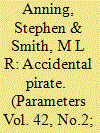

|
|
|
| 2 |
ID:
143234
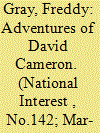

|
|
|
|
|
| Summary/Abstract |
“BRITAIN HAS got its mojo back,” said the British Chancellor of the Exchequer George Osborne on December 7. He wasn’t doing an impression of Austin Powers. He was speaking to the Council on Foreign Relations about the British Parliament’s decision to bomb ISIS in Syria. Osborne explained to the council that he and the prime minister, his close friend and ally David Cameron, had tried to intervene militarily in Syria two years earlier and had been rebuffed by the House of Commons. “It was quite a striking moment,” he recalled, with sadness. “It was a moment when Britain was unable to follow the lead asked of it by our prime minister and the government.” But George Osborne felt better because now Britain was dropping bombs over Syria—for him a “source of real pride.”
|
|
|
|
|
|
|
|
|
|
|
|
|
|
|
|
| 3 |
ID:
122469
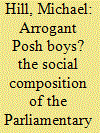

|
|
|
|
|
| Publication |
2013.
|
| Summary/Abstract |
In the light of the recent controversy over Andrew Mitchell's alleged 'pleb' comments to police officers and Nadine Dorries' characterisation of David Cameron and George Osborne as 'arrogant posh boys, this article examines the social composition of the parliamentary Conservative Party. It looks at previous attempts to widen the social base of the PCP and analyses the effect of Cameron's priority or 'A' list of candidates on the composition of the 2010 PCP. The article asks whether the perception that the Conservatives are the party of the rich has damaged the party's electoral appeal and if so what can be done to rectify the situation.
|
|
|
|
|
|
|
|
|
|
|
|
|
|
|
|
| 4 |
ID:
129205
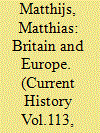

|
|
|
|
|
| Publication |
2014.
|
| Summary/Abstract |
After a tumultuous professional marriage of just over 40 years, Britain and Europe are facing the possibility of divorce. In January 2013, Prime Minister David Cameron decided to celebrate Britain's 40th anniversary as a member of the European Union by pledging a fundamental renegotiation of his country's terms of membership. Cameron further promised to submit any renegotiated deal to a clear "in-or-out" referendum in 2017 on whether or not to leave the EU, assuming his own Conservative Party wins a majority in the next general election in May 2015. Egged on by his party's growing ranks of restive Euroskeptics and trying to fight off a challenge on his right flank from populist Nigel Farage's UK Independence Party (UKIP), Cameron rolled the dice. He hoped to settle once and for all the Europe question, which has so often cast a dark shadow over the political debate in Westminster and Whitehall. Renegotiating
|
|
|
|
|
|
|
|
|
|
|
|
|
|
|
|
| 5 |
ID:
100991
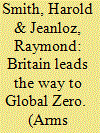

|
|
|
|
|
| Publication |
2010.
|
| Summary/Abstract |
The United Kingdom, not the United States or Russia, is leading the way along a path to a possible world without nuclear weapons. The British not only are reducing the number of nuclear weapons, but in so doing are making an implicit statement, through the resultant force posture, about the kind of deterrence that nuclear weapons provide. Can and should the superpowers follow the same path?
|
|
|
|
|
|
|
|
|
|
|
|
|
|
|
|
| 6 |
ID:
149458
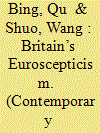

|
|
|
|
|
| Summary/Abstract |
Britain has voted to leave the European Union by 51.9% to 48.1% in June 2016. David Cameron announced his resignation following the vote for Brexit. Euroscepticism in the British public has been rising and political debates over how to handle Britain’s Relationship with the EU have also been intensifying. The numbers wanting a Brexit had been growing. With the EU trapped in a quagmire made of multiple crises, Britain’s referendum would be the same as rubbing salt into the wounds. A Brexit would not affect just Britain and the EU but it would have an effect on the entire world. Why did Britain opt out when it already enjoys a preferential status in the EU—it is outside the Eurozone and Schengen area? Why did the British public vote for Brexit when it was obvious that it would cause more harm than good? What was the underlying logic? This essay searches for the roots of Britain’s Eurosceptism by tracing back to post-World War II Britain-European relations and attempts to anticipate the possible impacts of the Brexit referendum.
|
|
|
|
|
|
|
|
|
|
|
|
|
|
|
|
| 7 |
ID:
092369
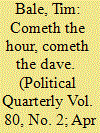

|
|
|
|
|
| Publication |
2009.
|
| Summary/Abstract |
While one can overstate the extent to which the Conservative party has changed since 2005, especially in the light of its response to the recession, the upturn in its electoral prospects is undeniable. Not surprisingly, the Conservative leader, David Cameron, is widely credited with turning around his party's fortunes. In fact, he started with several advantages over his predecessors: New Labour was well past its prime; the economy was running into trouble; and an increasingly desperate Conservative party was more willing to listen to the message that it needed to modernise and moderate. That said, Cameron has been crucial. His communication skills are unparalleled. Early success bought him time and 'permission to be heard'. Most important though, has been his determination-despite media criticism-to stick with a staged strategy focused on conveying change and a move to the centre ground while at the same time reassuring and dividing the Tory right.
|
|
|
|
|
|
|
|
|
|
|
|
|
|
|
|
| 8 |
ID:
099782
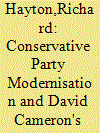

|
|
|
|
|
| Summary/Abstract |
A key feature of David Cameron's electoral appeal is his carefully cultivated image as a 'family man'. Cameron has repeatedly stressed the importance of the family to his political views and stated his desire to see marriage rewarded through the tax system. At the same time, Cameron has presented himself as a modernising leader, keen to demonstrate that he and his party are in touch with contemporary society. Central to this effort to detoxify the Conservative brand has been an emphasis on social liberalism. The potential conflict between these two objectives reflects the division in the party between social liberals and traditionalists, which has become increasingly apparent over the past decade. This article examines Conservative party policy and rhetoric on social and moral issues since 1997, particularly gay rights and family policy. It notes that a significant divide remains in the Conservative party between social liberals and traditionalists, so in this respect Cameron's modernisation project remains far from complete
|
|
|
|
|
|
|
|
|
|
|
|
|
|
|
|
| 9 |
ID:
141730
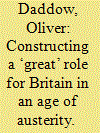

|
|
|
|
|
| Summary/Abstract |
This article interprets the ideational underpinnings of the British Conservative–Liberal coalition government’s foreign policy from 2010 to 2015. It uses qualitative discourse analysis of speeches, statements and policy documents to unpack the traditions of foreign policy thought which informed some of the key foreign policy practices of the coalition government. The analysis centres on the British identity constructed by liberal Conservatives, and the values and interests flowing from this baseline identity that the government’s foreign policy sought to express through its foreign policy. Liberal Conservative foreign policy is argued to have been an attempt to come to terms with the limits on Britain’s international agency in the face of three major foreign policy dilemmas: the legacy of the New Labour years, dramatically reduced economic resources in the ‘age of austerity’ and an increasingly restricted capacity for Britain to exercise ideational entrepreneurship in the international community. The article substantiates the claim in the extant literature that liberal Conservatism significantly adapted but did not restructure an established British foreign policy tradition of merging values and interests in complex ways.
|
|
|
|
|
|
|
|
|
|
|
|
|
|
|
|
| 10 |
ID:
123041
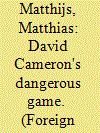

|
|
|
|
|
| Publication |
2013.
|
| Summary/Abstract |
Despite his innate caution and usually sound political instincts, British Prime Minister David Cameron is gambling with his country's future. In January, in a long-anticipated speech, he called for a wide-ranging renegotiation of the terms of the United Kingdom's membership in the European Union and promised to put the result up for a straight in-or-out popular referendum by the end of 2017 (assuming his party wins the next election, due in 2015). A British exit from the EU is now more likely than ever -- and it would be disastrous not only for the United Kingdom but also for the rest of Europe and the United States.
|
|
|
|
|
|
|
|
|
|
|
|
|
|
|
|
| 11 |
ID:
119891
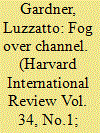

|
|
|
|
|
| Publication |
2012.
|
| Summary/Abstract |
On October 22, 1957, a London Times headline declared: "Heavy Fog in Channel - Continent Cut Off." Britain's tabloid press displayed similar insularity in early December, 2011 after Prime Minister David Cameron vetoed an effort by the other members of the European Union to amend the Lisbon Treaty.
|
|
|
|
|
|
|
|
|
|
|
|
|
|
|
|
| 12 |
ID:
084478
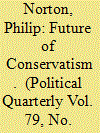

|
|
|
|
|
| Publication |
2008.
|
| Summary/Abstract |
British Conservatism embodies certain basic, though not always compatible, tenets of belief. They have underpinned the Conservative Party, which has been the most successful political party in the history of western Europe. The party was the 'in' party in British politics in the 20th Century; the reasons for that success shifted in the 21st century to it principal opponent party. Attempts by Conservative leaders in the first two parliaments of opposition constituted quick-fix and ultimately doomed approaches to restoring electoral dominance. The party under David Cameron has shifted to a long-term, grounded approach, learning the lessons of earlier periods of opposition. Though the process remains incomplete, the Conservative Party is placed for the first time in the 21st century to return to being a party of governance.
|
|
|
|
|
|
|
|
|
|
|
|
|
|
|
|
| 13 |
ID:
111677
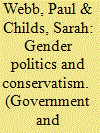

|
|
|
|
|
| Publication |
2012.
|
| Summary/Abstract |
Can conservatives be feminists? This article examines the issue by exploring the case of the British Conservative Party, drawing on a new survey of party members. Under David Cameron's leadership, reforms have been made to the party's parliamentary selection procedures and distinct women's policies developed, thus addressing both the descriptive and substantive representation of women. We examine party members' attitudes towards three types of gender issue: basic orientations towards gender roles and relations; specific policy measures relevant to the substantive representation of women; and the descriptive representation of women. Detailed empirical analysis reveals that there is significant support for progressive liberal feminist positions on each of these dimensions in the party, and that sex, age and basic ideological dispositions drive such attitudes to varying degrees. Even so, support for a liberal feminist position on the descriptive representation of women - that is, the aspect of gender politics where the leadership has been most active - remains on the whole quite limited.
|
|
|
|
|
|
|
|
|
|
|
|
|
|
|
|
| 14 |
ID:
107206
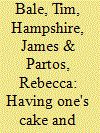

|
|
|
|
|
| Publication |
2011.
|
| Summary/Abstract |
The May 2010 general election represented a change in tone on immigration and asylum policy for the Conservative party. Although its manifesto still contained a promise to limit numbers and expressed concern about the abuse of student visas, the Party's previous fixation with asylum seekers had disappeared. This article considers the rationale for these developments in the light of David Cameron's election as leader in late 2005 and his efforts from then on to reposition his party. Cameron's initial silence on this issue and his appointment of a moderate as immigration spokesman were part of an attempt both to shift the focus onto the economic impact of migration and, more broadly, to 'decontaminate the Tory brand' in order to gain 'permission to be heard' by small-l liberals who were critical to the Party's electoral recovery but alienated by hard-line stances. That said, immigration was never entirely forgotten even in this early period and was always seen, so long as it was carefully handled, as an issue capable of benefitting the Tories. As such, it was skilfully factored back into the Party's offer from late 2007 onwards. In government, the Conservatives may have the upper hand on immigration over their junior coalition partner, but this is no guarantee that they will be able to deliver the outcomes they promised
|
|
|
|
|
|
|
|
|
|
|
|
|
|
|
|
| 15 |
ID:
133790
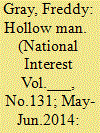

|
|
|
|
|
| Publication |
2014.
|
| Summary/Abstract |
Who is the real David Cameron? We'll probably never know-and he may not, either.
IN ANTHONY TROLLOPE'S NOVELPhineas Redux, Mr. Daubeny, a prime minister modeled on Benjamin Disraeli, proudly announces, "See what we Conservatives can do. In fact we will conserve nothing when we find that you do not desire to have it conserved any longer." It's a credo that Prime Minister David Cameron appears to live by.
|
|
|
|
|
|
|
|
|
|
|
|
|
|
|
|
| 16 |
ID:
123251
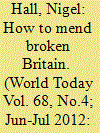

|
|
|
|
|
| Publication |
2012.
|
| Summary/Abstract |
Nigel Hall and Cat Tully point to the Victorian tricks that spread wealth.
|
|
|
|
|
|
|
|
|
|
|
|
|
|
|
|
| 17 |
ID:
141728
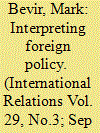

|
|
|
|
|
| Summary/Abstract |
This Special Issue advances an interpretive research programme into Foreign Policy Analysis (FPA) and International Relations by showcasing new work on the study of foreign policy and regional cooperation. This introductory article explains the rationale and contents of the Special Issue in three parts. The opening part explains how the contributions complement the broader study of ideas in FPA and International Relations through a critique of methodological positivism in the social sciences. The second part elaborates the theoretical framework used to cohere the collection, which centres on the study of ‘situated agents’ who, when confronted with policy dilemmas, draw on inherited traditions to inform their foreign policy practices. This is accompanied by a methods case study centring on David Cameron’s European Union referendum strategy, which is used to illustrate the practical ways in which one can conduct interpretivist research into foreign policy. In conclusion, we spell out how the contributors conducted their work to advance the interpretivist research programme.
|
|
|
|
|
|
|
|
|
|
|
|
|
|
|
|
| 18 |
ID:
120454
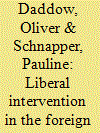

|
|
|
|
|
| Publication |
2013.
|
| Summary/Abstract |
David Cameron was a critic of Tony Blair's doctrine of the 'international community', which was used to justify war in Kosovo and more controversially in Iraq, suggesting caution in projecting military force abroad while in opposition. However, and in spite of making severe cuts to the defence budget, the Cameron-led Coalition government signed Britain up to a military intervention in Libya within a year of coming into office. What does this say about the place liberal interventionism occupies in contemporary British foreign policy? To answer this question, this article studies the nature of what we describe as the 'bounded liberal' tradition that has informed British foreign policy thinking since 1945, suggesting that it puts a distinctly UK national twist on conventional conservative thought about international affairs. Its components are: scepticism of grand schemes to remake the world; instinctive Atlanticism; security through collective endeavour; and anti-appeasement. We then compare and contrast the conditions for intervention set out by Tony Blair and David Cameron. We explain the similarities but crucially the vital differences between the two leaders' thinking on intervention, with particular reference to Cameron's perception that Downing Street needed to loosen its control over foreign policymaking after Iraq. Our argument is that policy substance, policy style and party political dilemmas prompted the two leaders to reconnect British foreign policy with its ethical roots, ingraining a bounded liberal posture in British foreign policy after the moral bankruptcy of the John Major years. This return to a pragmatic and ethically informed foreign policy meant that military operations in Kosovo and Libya were undertaken in quite different circumstances, yet came to be justified by similar arguments from the two leaders.
|
|
|
|
|
|
|
|
|
|
|
|
|
|
|
|
| 19 |
ID:
132115
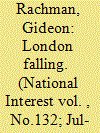

|
|
|
|
|
| Publication |
2014.
|
| Summary/Abstract |
LATER THIS year, the United Kingdom could disunite. In September, Scotland is due to vote on whether to become an independent nation. There is a strong chance that the Scots will vote to go it alone, breaking a political union with England that was established over three hundred years ago, through the Act of Union of 1707. The Scots number only 5.3 million of the United Kingdom's population of 63.7 million. But Scotland accounts for a large amount of Britain's territory and coastline-and contains several of the nation's finest universities, castles and golf courses. Moreover, Scotland is also where Britain's nuclear weapons are based, and the country's (dwindling) oil supplies are almost all located in Scotland's coastal waters.
|
|
|
|
|
|
|
|
|
|
|
|
|
|
|
|
| 20 |
ID:
097836
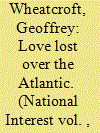

|
|
|
|
|
| Publication |
2010.
|
| Summary/Abstract |
IN MARCH 2001, the once youthful but now veteran Tory politician William Hague gave a speech at a Conservative Party conference in which he banged the anti-European drum. In March 2003, he gave another speech, in Parliament, in which he warmly endorsed Tony Blair's support for the American invasion of Iraq. In July 2010, he spoke once more, this time in the celebrated Locarno Room at the Foreign Office. But his tune had changed: like Prime Minister David Cameron, now-Foreign Secretary Hague has intimated that he seeks to distance Britain from reflexive support for Washington, and he says that, in a new multipolar world, he wants to move more generally from an obsession with the "blocs"-the United States, Europe and the Middle East-to forge fresh links with such emerging powerhouses as India, China and Brazil.
|
|
|
|
|
|
|
|
|
|
|
|
|
|
|
|
|
|
|
|
|